My biggest issue when transitioning to a diet consisting of healthier food, is I’m constantly hungry. I can wake up and eat 3 eggs, a bowl of Greek yogurt, and a blueberry bagel and be starved still. I certainly do not want to starve myself but on the other hand, I don’t want to over indulge either. Anyone else battle this and how do you deal with it? It’s probably the number 1 factor in a failed healthy diet for me.
You are using an out of date browser. It may not display this or other websites correctly.
You should upgrade or use an alternative browser.
You should upgrade or use an alternative browser.
Hunger
- Thread starter bmicek
- Start date
LongWayAround
WKR
- Joined
- Aug 10, 2015
- Messages
- 2,305
I'm hungry if I don't eat meat.
*zap*
WKR
Why not just always eat good, healthy, natural foods and never have to 'transition' to a diet?
Sustainability of good nutrition is one of the main keys to a healthy diet/weight issues. The other is daily liss.
Sustainability of good nutrition is one of the main keys to a healthy diet/weight issues. The other is daily liss.
- Thread Starter
- #4
Doesn’t really answer my question. My goal is a healthy diet. I’m asking about dealing with the hunger that comes with my transition to a healthy diet.Why not just always eat good, healthy, natural foods and never have to 'transition' to a diet?
Sustainability of good nutrition is one of the main keys to a healthy diet/weight issues. The other is daily liss.
*zap*
WKR
Actually, if you stay on a good healthy diet you will never have to deal with the 'transition' period again.
I would make sure I understood what a good healthy natural food diet was and then transition to it over time with sustainability as my goal. The body does not deal well with sudden drastic changes.
I would make sure I understood what a good healthy natural food diet was and then transition to it over time with sustainability as my goal. The body does not deal well with sudden drastic changes.
- Thread Starter
- #6
I appreciate the help. Makes perfect sense. Like you mention, I’m sure it’s just a shock to my body switching so quickly to a different diet. Thanks againActually, if you stay on a good healthy diet you will never have to deal with the 'transition' period again.
I would make sure I understood what a good healthy natural food diet was and then transition to it over time with sustainability as my goal. The body does not deal well with sudden drastic changes.
Mike Islander
WKR
My biggest issue when transitioning to a diet consisting of healthier food, is I’m constantly hungry. I can wake up and eat 3 eggs, a bowl of Greek yogurt, and a blueberry bagel and be starved still. I certainly do not want to starve myself but on the other hand, I don’t want to over indulge either. Anyone else battle this and how do you deal with it? It’s probably the number 1 factor in a failed healthy diet for me.
I've been on a meat, fat, and veggie diet since 2015. I don't get hungry, or at least I don't get those crazy food cravings like I used to. I basically eat a slide of toast for breakfast with plenty of butter on it, two if I am going to have a heavy workday. Lunch is a chunk of meat, poultry, or fish and a big bowl of cooked veggies with butter on them. Supper is whatever the wife cooks, with very little of whatever starch she makes (usually rice, since she is a Charleston native). If I do feel like a snack between meals it's a couple bite of yogurt or some nuts.
I believe sugars and simple carbs drive hunger like no other foods. Avoiding simple carbs reduces insulin spikes, which are one of the primary drivers of hunger. Proteins, fats, and fiber keep you feeling full.
Laramie
WKR
- Joined
- Apr 17, 2020
- Messages
- 2,619
The transition feeling aren't really hunger but rather your body going through withdrawals for sugars and carbs. As mentioned above, once you switch to a diet of mainly proteins, fats, vegetables, and fruit, it goes away pretty quickly. The more you "cheat" on carbs & sugars, the hungrier you become for them. Remember, your body is programmed to store fat so you are "ready" for the next time food isn't available.
The reason I know the above is because I like to drink too much beer in the winter so have to fight myself each spring. Almonds have been a life saver for me during the transitions. They seem to really curb my hunger without adding weight. Good luck
The reason I know the above is because I like to drink too much beer in the winter so have to fight myself each spring. Almonds have been a life saver for me during the transitions. They seem to really curb my hunger without adding weight. Good luck
- Thread Starter
- #9
That really helps to put it into perspective. That was previously exactly what I’d do, reach for a simple carb/something high in sugar to quench my hunger. That was before my transition to eat healthier foods. But what you describe sounds exactly what my body is going through. Thanks again for the help.I've been on a meat, fat, and veggie diet since 2015. I don't get hungry, or at least I don't get those crazy food cravings like I used to. I basically eat a slide of toast for breakfast with plenty of butter on it, two if I am going to have a heavy workday. Lunch is a chunk of meat, poultry, or fish and a big bowl of cooked veggies with butter on them. Supper is whatever the wife cooks, with very little of whatever starch she makes (usually rice, since she is a Charleston native). If I do feel like a snack between meals it's a couple bite of yogurt or some nuts.
I believe sugars and simple carbs drive hunger like no other foods. Avoiding simple carbs reduces insulin spikes, which are one of the primary drivers of hunger. Proteins, fats, and fiber keep you feeling full.
- Thread Starter
- #10
Makes perfect sense. Helps me make sure I stay on the right path by avoiding the foods that trigger withdrawals/insulin spikes.The transition feeling aren't really hunger but rather your body going through withdrawals for sugars and carbs. As mentioned above, once you switch to a diet of mainly proteins, fats, vegetables, and fruit, it goes away pretty quickly. The more you "cheat" on carbs & sugars, the hungrier you become for them. Remember, your body is programmed to store fat so you are "ready" for the next time food isn't available.
The reason I know the above is because I like to drink too much beer in the winter so have to fight myself each spring. Almonds have been a life saver for me during the transitions. They seem to really curb my hunger without adding weight. Good luck
*zap*
WKR
Plenty of natural foods have sugar and those foods can help with a gradual transition. Any drastic change people make is very hard on the body and also hard to maintain.....most folks will just quit eventually and then the change is not sustainable.
It may take months to gradually change to an all natural diet but in the end it can be a sustainable goal. First you need to understand what a 'natural' diet is.
Fad diets are not a good solution for weight control.
It may take months to gradually change to an all natural diet but in the end it can be a sustainable goal. First you need to understand what a 'natural' diet is.
Fad diets are not a good solution for weight control.
1. You could try adding some oatmeal to breakfast
2. Generally, eating a diet of foods that are prepared from raw ingredients will go a long way towards health. It's hard to get too messed up if you're eating lots of veggies, and lean, unprocessed meats.
2. Generally, eating a diet of foods that are prepared from raw ingredients will go a long way towards health. It's hard to get too messed up if you're eating lots of veggies, and lean, unprocessed meats.
*zap*
WKR
Natural foods generally have one ingredient. Look at the ingredient label.....anything with more than one item and maybe less than 1% of other things is not a natural food.
Eliminate one group of bad food at a time and move on, cut down the bad food and add on the good foods as you go......gradual change is sustainable. Fast drastic change results in failure most often because it is unsustainable.
The main reason people fail at being fit is they try to do too much too soon and then they just get worn and quit. The people who start with a reasonable and sustainable amount and gradually add more are generally successful.
If your craving sugar eat blueberries.
Eliminate one group of bad food at a time and move on, cut down the bad food and add on the good foods as you go......gradual change is sustainable. Fast drastic change results in failure most often because it is unsustainable.
The main reason people fail at being fit is they try to do too much too soon and then they just get worn and quit. The people who start with a reasonable and sustainable amount and gradually add more are generally successful.
If your craving sugar eat blueberries.
go_deep
WKR
- Joined
- Jan 7, 2021
- Messages
- 1,647
Before you ever eat drink a glass of water, drink water with your meal, and continue to sip on water after you eat to stay full.
Mike Islander
WKR
It also depends on what you are substituting for what you used to eat. I LOVE pan fried meat or fish. I eat a nice ribeye/fillet, cod, chicken breast, or pork chop fried in olive oil five days a week (cooked on a hotplate in my office). The chicken and fish is usually lightly breaded with Panko or Italian bread crumbs. Along with the protein I eat a huge bowl of veggies with butter or sometimes a bit of grated cheddar cheese. These foods are absolutely delicious to me. No problem eating that instead of some processed frozen dinner meal or shitty fast food burger.
Eat GOOD foods that you love. Don't keep anything processed in your house, on the shelf or in the fridge. Repeat to yourself "that shit is poison" when you pass a fast food restaurant or are eying a candy bar or processed food in the store. With really good foods that you like, it's really not that hard to stop eating junk foods. Just have plenty of the good foods ready to go, on the shelf or in your fridge.
I keep frozen steaks and fish in individual portions in my work freezer. When I get to the office I put one of them in front of a little countertop fan to thaw. I keep big bags of mixed veggies in the freezer as well. Put a pile in a bowl with plastic wrap on top and microwave for four minutes when it's time to eat. While that is microwaving cook your meat or fish. Add butter or cheese to your veggies and enjoy an awesome meal that you'd pay $30 for at a fine restaurant, all the while knowing you spent $4 - $9 bucks for an awesome and healthy meal.
I cooked all these in my office on a hotplate!
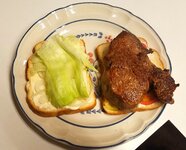
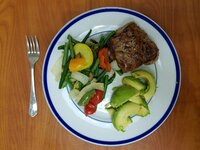
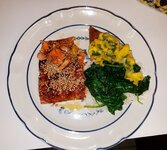
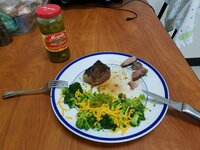
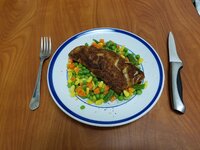
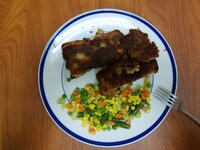
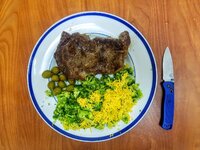
Eat GOOD foods that you love. Don't keep anything processed in your house, on the shelf or in the fridge. Repeat to yourself "that shit is poison" when you pass a fast food restaurant or are eying a candy bar or processed food in the store. With really good foods that you like, it's really not that hard to stop eating junk foods. Just have plenty of the good foods ready to go, on the shelf or in your fridge.
I keep frozen steaks and fish in individual portions in my work freezer. When I get to the office I put one of them in front of a little countertop fan to thaw. I keep big bags of mixed veggies in the freezer as well. Put a pile in a bowl with plastic wrap on top and microwave for four minutes when it's time to eat. While that is microwaving cook your meat or fish. Add butter or cheese to your veggies and enjoy an awesome meal that you'd pay $30 for at a fine restaurant, all the while knowing you spent $4 - $9 bucks for an awesome and healthy meal.
I cooked all these in my office on a hotplate!







5MilesBack
"DADDY"
I've never really understood the whole "hunger" thing. I don't really get hungry, I just eat because it's lunch time or dinner time. I don't eat breakfast........just have my coffee. I hunted with a guy once that had to be eating something like every 20 minutes. I'm not even sure how people get anything accomplished like that.
thinhorn_AK
"DADDY"
Are you getting adequate calories?
B_Reynolds_AK
WKR
Unintentionally, you are intermittent fasting. Skipping breakfast increases the time you are going without food and shortening your feeding window. This will help with your body becoming fat adapted and will have the effect of lessening your hunger.I've never really understood the whole "hunger" thing. I don't really get hungry, I just eat because it's lunch time or dinner time. I don't eat breakfast........just have my coffee. I hunted with a guy once that had to be eating something like every 20 minutes. I'm not even sure how people get anything accomplished like that.
The OP would benefit by looking into IF or time restricted feeding. I know for myself, the metabolic changes from doing this have been great. I no longer bonk in the mountains and am nowhere near as hungry all the time like I used to be.
Decide on a diet and eat as much as you want of it.
My elk diet consists of meat, eggs, cheese, fruit and veggies. No breads or pastas (which evidently I eat a lot). I can eat as much as I want if these things and still lose 20 lbs or more in a month. I realize everyone is different but it’s seams to work well for me.
My elk diet consists of meat, eggs, cheese, fruit and veggies. No breads or pastas (which evidently I eat a lot). I can eat as much as I want if these things and still lose 20 lbs or more in a month. I realize everyone is different but it’s seams to work well for me.
- Thread Starter
- #20
So you don’t see any issues with using a cup of coffee as a substitute for breakfast? Truthfully, I’ve been able to have coffee and that’ll carry me out until lunch. Not because I was trying to cut back on how much I was eating, it just kind of happened without me noticing it.Unintentionally, you are intermittent fasting. Skipping breakfast increases the time you are going without food and shortening your feeding window. This will help with your body becoming fat adapted and will have the effect of lessening your hunger.
The OP would benefit by looking into IF or time restricted feeding. I know for myself, the metabolic changes from doing this have been great. I no longer bonk in the mountains and am nowhere near as hungry all the time like I used to be.
Similar threads
Featured Video
Stats
Latest Articles
-
Gunnison Mule Deer and Beyond with Brandon Diamond
-
Idaho Mule Deer Management with Eric Freeman
-
TT#28 Idaho Bear Hunting with Roger Holscher and Chris Young
-
Rockstar Research with Kevin Monteith
-
Hunting Big Mule Deer: Obey the Wind & Still-Hunting
-
TT#27 DIY New Zealand Hunting with Australian Duo Miller and Pitts
-
Fewer Bucks, More Fawns?
-
Mathews Lift Review
-
Wyoming Range Winter Wrap-Up with Jeff Short
-
The Pursuit with Cliff Gray
